The 5 Fastest Charging Electric Cars in 2023
What is Fast Charging in Electric Cars? Why does it matter?
Fast-Charging in electric vehicles (EVs) is about speedily replenishing your EV’s battery, substantially cutting down the time you spend waiting. It’s one key attribute you’d want in your EV, making your cross-country drives and everyday commutes efficient, quick and worry-free. What is great about EVs is that the fastest-charging electric cars on the market today range from performance-oriented models to commuter cars.
So, why does it matter how fast your EV fast charges? Aren’t they all the same? The short answer is no. The long answer and all the details you are looking for are below.
Factors to Consider When Choosing a Fast-Charging Electric Car
Speed of Charging
Charging speed is vital when choosing an electric car. It influences how quickly you’re back on the road, impacting commuting ease and long trips’ convenience. When looking for a fast-charging EV, consider the following aspects of charging:
- Charging time to 80% battery capacity. After 80% battery charging speed slows down considerably. The final 20% can take almost as long as getting the first 70-80%. This is normal for EVs. Unless you need every last mile of your range and are able to stay in one place for a while, it’s best to get to 80% and get going to your destination.
- EV’s charging infrastructure can be broken down into two camps for the moment. There is the Tesla Supercharging network and CCS, which has many different providers such as EVGo, Electrify America, ChargePoint, and many others. Tesla’s North American Charging Standard (NACS) is being adopted by manufacturers in conjunction with Tesla opening their network to non-Tesla vehicles. Tesla’s network is currently the most reliable. That being said, there you can still travel long distances just fine, a staff member of EV Universe is currently long-term testing a Rivian R1T pickup truck and has taken many overnight trips with little issue.
- Fast Chargers should not be used daily as they put wear and tear on the battery which could damage the battery capacity. The general rule is to leave the fast charging only for when it’s needed on long-distance trips.
Charging Range
Understanding the charging range is vital when shopping for a fast-charging electric vehicle. It’s not just about how quickly your EV charges, but also the miles per charge. For instance, the Porsche Taycan has an impressive charge rate of 31 miles per hour of charging. That’s under ideal conditions such as ideal temperature both ambient and battery pack and finding a charger that can maximize your charging speed. Remember, your best EV doesn’t just charge fast; it also delivers the distance and you can find enough chargers with the capability to deliver that power and speed.
Charging Time
As an electric car owner, charging speed directly affects your road-tripping potential. Cars like the Model 3 and Lucid Air can charge extremely fast on a Level 3 DC Fast Charger, making road trips more convenient. But remember, your actual mileage and charging times might sway from EPA estimates.
Model 3: 15 minutes for 147 miles
Lucid Air: 12 minutes for an added 200 miles
In essence, understanding your car’s charging speed is crucial in planning your trips – it’s equally as vital as the battery capacity itself. Choose wisely!
Charging Interface & Output of Charging Station
When choosing a fast-charging electric car, the charging interface is crucial. It not only affects how quickly your car charges but also where you can plug in. Typically, chargers vary by current such as AC or DC, connector type, power output, and charge time. The common types are Level 1, Level 2, and DC Fast Charging.
Level 1: Output of 1kW, charges BEVs in 40-50 hours. This is ideal for home use with low weekly miles driven and you can let the vehicle charge over the course of a day.
Level 2: Outputs 7-19kW, BEV in 4-10 hours. Great for at-home use, workplace, and public use.
DC Fast Charging: Outputs 50-350kW, charges BEV in 20 minutes to 1 hour. Great for public use and travel. May require an adapter in some instances such as charging a Tesla at a CCS connector-type DC Fast Charger.
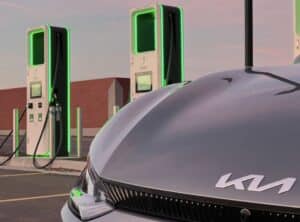
The pros and cons are defined not only by power output and charging time but also by the reliability of the charger and ease of use. Some payment processing can be trickier than the should be on CCS-type chargers.
Always check the vehicle’s compatibility with these chargers (CCS vs. NACS- Tesla connector) and the potential fast-charge feature in its specifications.
Cost of Charging
Thinking of investing in an electric vehicle? The cost of charging is another factor you should consider. However, it’s probably not what you are thinking…
Daily Charging at Home: This is by far the most inexpensive way to charge. Done at night and with incentives from your local power authority and it’s even cheaper. Many people don’t even notice an increase in their monthly electric bills.
Charger Install Cost: This can be a bit pricey, anywhere from a few hundred to just under $2,000. It’s important to discuss with a local installer to get an accurate estimate so you don’t have any surprises.
DC Fast Charging: It’s cheaper than filling up a gas tank but not by a lot. So don’t be surprised when taking a long trip, which is what DC fast charging is designed for.
Manufacturer-Charging Partnerships: Some manufacturers have partnerships with charging companies like Electrify America or ChargePoint for a period of free charging with your new car for a certain amount of time.
Remember, factors like location, station type, and provider significantly impact charging costs.
The 5 Fastest Charging Electric Cars in 2023
1. Lucid Air – 350 kW, 12 minutes for 200 miles of range
The Lucid Air is one of the fastest-charging electric cars of 2023 due to its cutting-edge 900V+ architecture and 350 kW charger. The Air has an EPA-rated range of up to 520 miles and a power output of up to 1096 hp. It also has a battery capacity of 112 kWh.
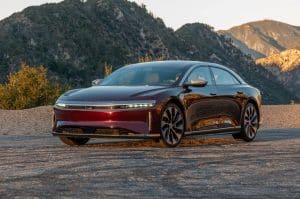
Positives:
- High range
- Fast charging time
- Intuitive design/high-end materials
- Free charging offer
- High power output
Drawbacks:
- Expensive model
- Limited availability
- Infotainment system can be laggy
- Fastest charging is limited to certain charging stations
- Will Lucid survive as a company?
The car can charge from 20% to 80% in just 15 minutes at a rapid charging station. It offers up to 40 miles of range per hour when connected to a standard home socket. It’s swift, sustainable, and seriously impressive!
2. Kia EV6 – 350kW, 10-80% in 18 minutes
Get ready for the Kia EV6, one of the quickest-charging electric cars out there in 2023. These siblings are sure to make EV charging seem like a breeze. The world’s first patented multi-charging system (400v and 800v DC charging) offers impressive capabilities. Notably, the Kia EV6 GT accelerates from 0 to 60 mph in 3.2 seconds, while achieving up to 310 miles on a single charge. Furthermore, the EV6 can charge from 10% to 80% in just 18 minutes using a fast charger. The available horsepower varies from 225 hp to an impressive 577 bhp, showcasing a diverse range of power options. Furthermore, the Kia EV6 offers flexibility with motor options, including both Single and Dual motor setups, while delivering superior torque of up to 446 pound-feet for an exhilarating driving experience.
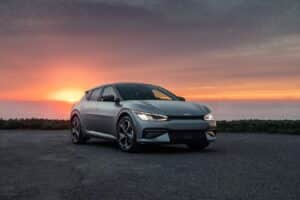
Positives:
- Excellent charging speed
- High performance capabilities
- Efficient with significant ranges
- Innovative charging technology
- Competitive pricing
- A blast to drive- one of our favorites!
Drawbacks:
- Limited availability of the 350kW charger
- Shorter range in the GT model
- Compromised rear visibility in the Ioniq 5
- Charging time may vary based on charger speed
3. Hyundai Ioniq 6 – 350 kW, 18 minutes
Sure, finding the right electric car can be challenging. That’s where the Hyundai Ioniq 6 steps in, giving you top-class charging speed, incredible mileage, and refined performance that’s worth your attention. With a focus on efficiency and convenience, the fast charging capability allows the battery to reach 10-80% in just approximately 18 minutes. Accompanying this feature is an extended range of up to 361 miles, ensuring longer journeys. Charging prowess is one key aspect of the Ioniq 6. A quick 18 minutes suffice to charge the battery from 10 to 80 percent using a 350-kW charger. Underpinning these attributes is an advanced battery boasting a substantial 77.4 kWh capacity.
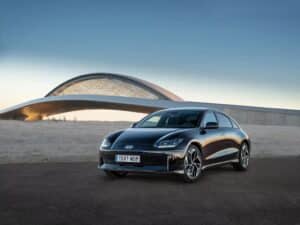
Positives:
- Battery performance: Fantastic mileage.
- Quick charging: Saves valuable time.
- High tech interior: Adds to the stylish appeal.
Drawbacks:
- Rear Visibility: Could be better.
- Front trunk size: Quite small.
- No rear wiper
- More expensive than you’d think
4. Audi E-Tron GT – 270kW, 21 minutes
Meet the Audi E-Tron GT, an electric beast with unique charging speed. Known for its fast charging ability, it offers more than just speed. The e-Tron GT showcases cutting-edge features and design elements. Notably, its 800V DC fast charging capability, with a maximum rating of 270 kW, ensures rapid charging for extended journeys. In addition to this, the vehicle is equipped with an 11 kW onboard charger, which can be upgraded to 22 kW, offering versatile charging options. Complementing these technical advancements is the car’s advanced electric sedan design, combining aesthetics and innovation seamlessly.
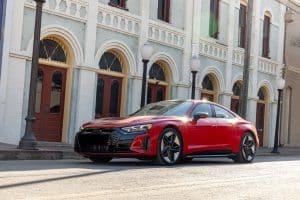
Positives:
- Charges 5-80% battery in 21 minutes, adding up to 180 miles of range.
- Two variants with horsepower up to 590.
- Advanced Type 2 AC charging.
- Aesthetically superior design.
- Comparable range with competitors.
Drawbacks:
- Pricey for its offering.
- Less range in comparison to price.
- Lack of single-motor option.
- Not as sharp to drive as some competitors.
- The cheaper IONIQ 5 outperforms it in terms of charging speed.
Though a bit pricier, its fast charging speed remains one of the top reasons to consider it.
5. Porsche Taycan – 270kW,
The 2023 Porsche Taycan is one of the fastest-charging electric vehicles you can own. With a whopping peak charging speed of 270 kW, it leaves many competitors in the dust. The Porsche Taycan embodies the pinnacle of high-performance German engineering. It offers a range of options, including single-motor rear-wheel-drive (RWD) and dual-motor all-wheel-drive (AWD) variants, catering to diverse driving preferences. Boasting exceptional capabilities, it can achieve a very fast charging speed of 270 kW, ensuring minimal downtime during long trips. Moreover, with an electric range of up to 246 miles, the Taycan delivers both exhilarating performance and practicality. Accommodating passengers in style, this 4-seater luxury electric car comes in six available trims, providing a range of choices to suit individual tastes.
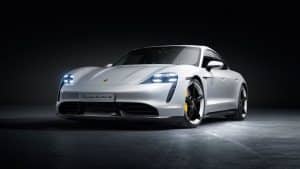
Positives:
- Gorgeous design
- Porsche driving feel
- Quality materials and fit/finish
Drawbacks:
- Tight on space
- Heavy
- Lower range
There’s always a trade-off, but the Taycan serves as an enticing option in the electric car segment.
Conclusion: Which Fast-Charging Electric Car is Right for You?
In conclusion, there’s more to buying an EV than just the model. Fast charging is a game-changing feature that sets some cars apart. Now, you know that you can check the vehicle’s specifications or look for the CCS or CHAdeMO charging ports to ascertain if an EV has fast-charging capabilities. Don’t forget: charging times would also depend upon the type of charger, battery capacity, and environmental factors. Therefore, when choosing your ideal EV, consider these elements related to charging and balance them with your unique needs, like driving habits and travel routes. Keep in mind that with technological advances, faster EV charging is becoming more accessible.
More on EV Universe:
- Insights & Updates: Stay updated in the world of electric vehicles with our insights section. Dive into our in-depth reviews, educational pieces, and the latest news.

